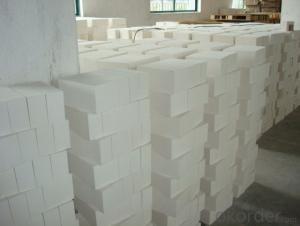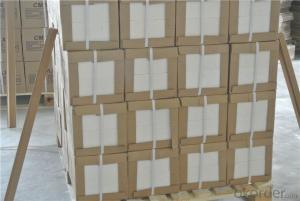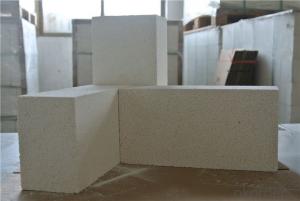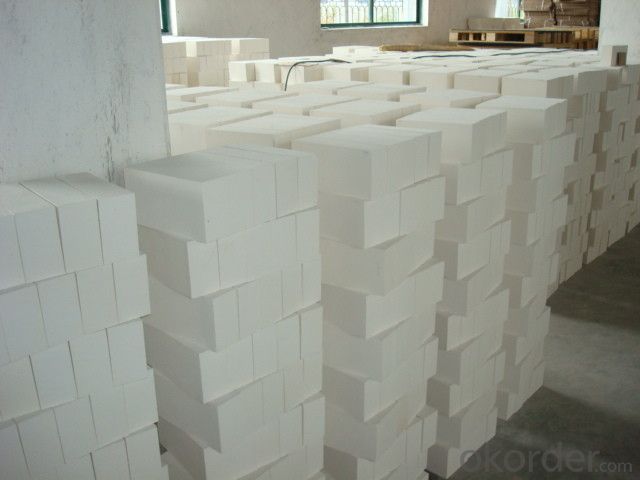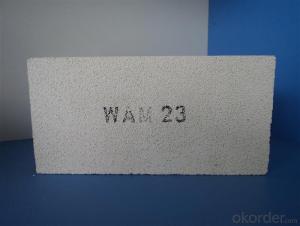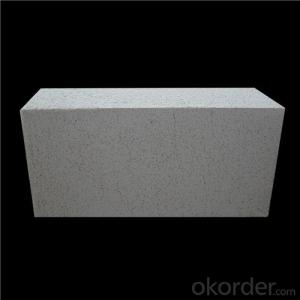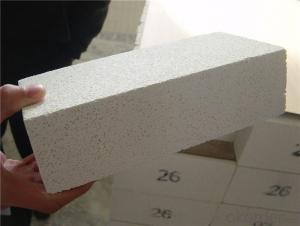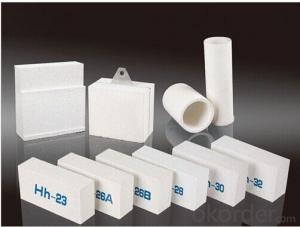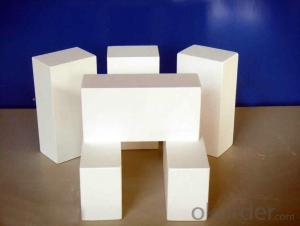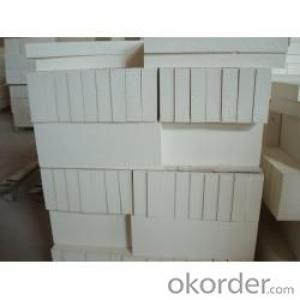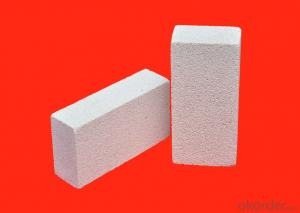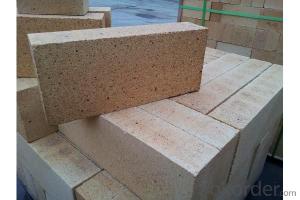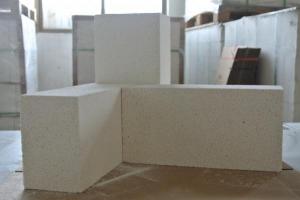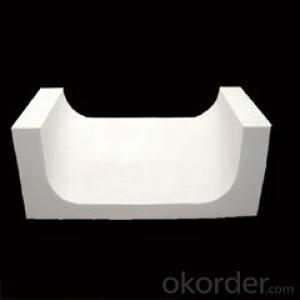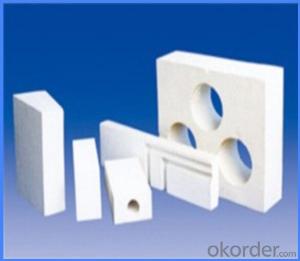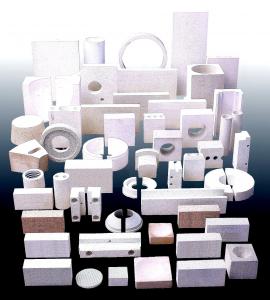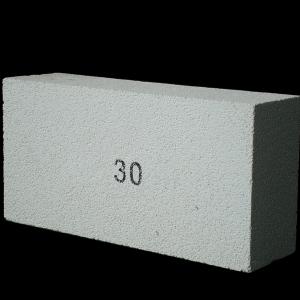Insulating Fire Brick - Mullite Insulation Brick
- Loading Port:
- Shanghai
- Payment Terms:
- TT OR LC
- Min Order Qty:
- 1 m.t.
- Supply Capability:
- 10000 m.t./month
OKorder Service Pledge
OKorder Financial Service
You Might Also Like
Thermal Insulation Fire Clay Brick
Refractory brick is a refractory material used in lining furnaces, kilns, fireboxes, and fireplaces.
We provide high quality Refractory Fire Bricks that are used on wide range in the various industries like Cement, Glass and Steel. Refractory Fire Bricks are provided as per the quantity and specifications required by the customers. We provide an extensive range of Refractory Fire Bricks at reasonable prices that depend upon the quantity ordered.
Application
Insulating Fire Brick are used for the lining of converter, alternating current arc furnace, direct Current arc furnace and the ladle slag line, etc.
Company Advantage
(1)Long Insulating Fire Brick manufacture history: 25 years manufacturer
(2)Advanced equipment and good service
(3)Diversification of production standards: ISO ANSI FEPA JIS ASTM
(4)Flexible payment: T/T L/C D/P D/A
(5)Professional marketing team and after-sale service
Insulating Fire Brick main feature:
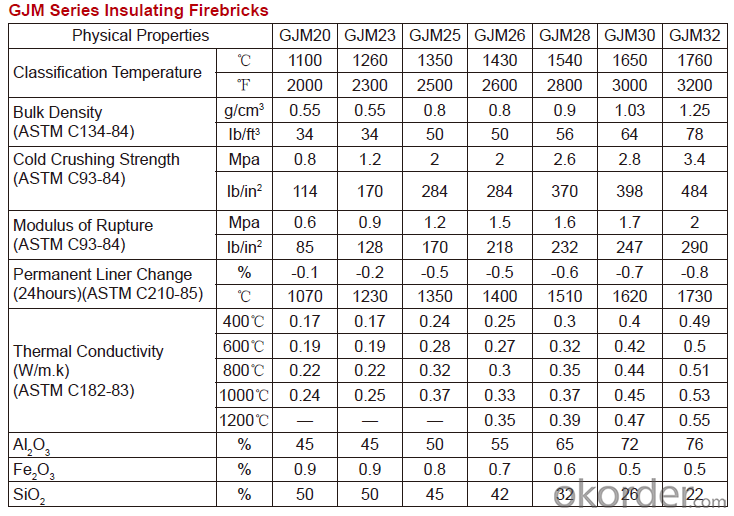
Equipment
1 unit of Ceramic Abrasive (SG Abrasive) pilot production line
2 units of Compact grain Abrasive pilot production lines
1 unit of high-end coated abrasives (abrasive cloth) production line
3 large flexible crushing and sieving lines for grit production lines
6 units of 5000KVA-10000KVA dumping type electric arc furnaces for Brown Fused Alumina fusion
FAQs
Q1 What’s the transport method?
A1 FCL delivery goods with wooden pallet or wooden case by sea; If LCL delivery, must with wooden case; Sometimes need open top, flat rack or bulk cargo.
Q2 What’s the required payment term?
A2 Generally 30% TT as the prepayment, 70% TT before delivery. If need, 100% Irrevocable Letter of Credit or negotiation.
Q3 Which country are our products exported to?
A3 Apart from entire Chinese market, the US, Russia, Japan, Korea, Australia and some Southeast Asian Nations.
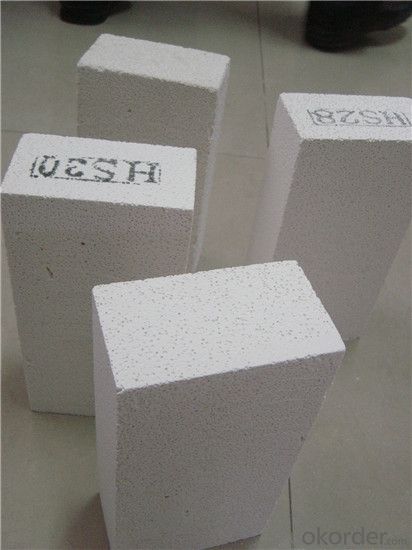
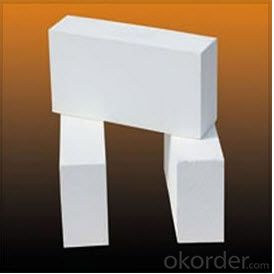
- Q: Do insulating fire bricks require any special curing or firing process before use?
- No, insulating fire bricks do not typically require any special curing or firing process before use. Insulating fire bricks are designed to be used as a form of insulation in high-temperature applications such as kilns, furnaces, and fireplaces. These bricks are made from lightweight materials that have high insulating properties, allowing them to withstand extreme temperatures while minimizing heat loss. Unlike traditional fire bricks, which are made from dense and heavy materials, insulating fire bricks are manufactured using a combination of lightweight aggregates and refractory clay. This composition gives insulating fire bricks their excellent thermal insulation properties. Due to their lightweight nature and low thermal conductivity, insulating fire bricks do not require any special curing or firing process before use. They can be installed directly in the desired application without any prior treatment. However, it is essential to ensure that the bricks are properly aligned and securely placed to maximize their insulating capabilities. It is worth noting that individual manufacturers may provide specific instructions or recommendations for the installation and use of their insulating fire bricks. Therefore, it is always advisable to consult the manufacturer's guidelines to ensure proper installation and usage of these bricks.
- Q: How do insulating fire bricks help improve the efficiency of heat treatment processes?
- Insulating fire bricks play a crucial role in improving the efficiency of heat treatment processes. These bricks are specially designed to have low thermal conductivity, which means they are excellent at insulating against heat transfer. This insulation property helps to minimize heat loss and maintain high temperatures within the heat treatment furnaces or kilns. By using insulating fire bricks, the heat treatment process can achieve higher temperatures more efficiently. The bricks act as a barrier, preventing the heat from escaping the furnace and ensuring that it remains concentrated inside. This not only enhances the overall energy efficiency of the heat treatment process but also reduces the need for excessive fuel consumption. Furthermore, insulating fire bricks also contribute to a reduction in the heating time required for the heat treatment process. Due to their low thermal conductivity, they minimize the heat loss to the surrounding environment, allowing the furnace to reach the desired temperature quickly. This not only saves time but also reduces the energy consumption associated with prolonged heating. In addition to thermal insulation, insulating fire bricks also provide mechanical strength and durability. They can withstand high temperatures without undergoing significant structural changes or damage. This ensures that the bricks maintain their insulating properties over an extended period, allowing for consistent and efficient heat treatment processes. Moreover, the use of insulating fire bricks helps to create a more controlled and stable thermal environment within the furnace or kiln. Their insulation properties prevent temperature fluctuations and hotspots, ensuring uniform heat distribution throughout the treatment process. This stability is crucial for achieving consistent and high-quality results in heat treatment applications. In conclusion, insulating fire bricks are essential in improving the efficiency of heat treatment processes. Their low thermal conductivity, ability to minimize heat loss, and capacity to withstand high temperatures contribute to reduced energy consumption, faster heating times, and improved temperature control. By incorporating these bricks, heat treatment operations can achieve higher efficiency, lower costs, and more consistent results.
- Q: Can insulating fire bricks be used in the construction of lime recovery kilns?
- Yes, insulating fire bricks can be used in the construction of lime recovery kilns. These bricks are designed to withstand high temperatures and provide excellent thermal insulation, making them suitable for such applications. They help to conserve energy and maintain the desired temperature within the kiln, enhancing the efficiency of the lime recovery process.
- Q: Can insulating fire bricks be used in the construction of ceramic fiber kilns?
- In the construction of ceramic fiber kilns, insulating fire bricks can indeed be utilized. These bricks are specifically designed to offer thermal insulation and minimize heat loss in high-temperature situations. Their exceptional insulating properties, characterized by low thermal conductivity, render them extremely suitable for maintaining elevated temperatures in kilns. The incorporation of insulating fire bricks in ceramic fiber kiln construction has the potential to heighten the kiln's overall energy efficiency and enhance its performance. However, it is crucial to guarantee that the insulating fire bricks selected align with the particular requirements and operating conditions of the ceramic fiber kiln to achieve optimal outcomes.
- Q: Can insulating fire bricks be used as a refractory lining material?
- Yes, insulating fire bricks can be used as a refractory lining material. Insulating fire bricks are designed to have low thermal conductivity, which means they can effectively insulate against heat transfer. This makes them suitable for applications where high temperatures need to be maintained or controlled, such as in kilns, furnaces, and industrial ovens. Refractory lining materials are used to protect the structure of these high-temperature environments from the extreme heat generated inside. They need to be able to withstand the thermal shocks, chemical reactions, and mechanical stresses that occur during operation. Insulating fire bricks offer excellent thermal insulation properties, as well as high temperature resistance, making them an ideal choice for refractory lining applications. In addition to their insulating properties, insulating fire bricks also have low density, making them lightweight and easier to handle and install. This can be beneficial in applications where weight is a concern or where refractory linings need to be replaced or repaired frequently. It is important to note that the specific type and composition of insulating fire bricks may vary, and different applications may require different properties. Therefore, it is essential to consult with a refractory engineer or supplier to ensure the chosen insulating fire bricks are suitable for the specific requirements of the application.
- Q: Can insulating fire bricks be used in the construction of pottery wheels?
- Yes, insulating fire bricks can be used in the construction of pottery wheels. Insulating fire bricks are designed to withstand high temperatures and provide excellent insulation, making them suitable for various applications in the pottery industry. When used in the construction of pottery wheels, these bricks can help to retain heat, allowing for more consistent and controlled firing of pottery. Additionally, their insulating properties can help to minimize heat loss and increase energy efficiency during the pottery wheel's operation. Overall, insulating fire bricks are a popular choice for pottery wheel construction due to their ability to withstand high temperatures and provide insulation, making them a suitable material for this purpose.
- Q: Are insulating fire bricks suitable for insulation in gas turbines?
- Insulating fire bricks are not typically suitable for insulation in gas turbines. While they are excellent for high-temperature insulation applications, such as in furnaces and kilns, gas turbines operate at even higher temperatures and require specialized insulation materials. Gas turbines typically utilize thermal barrier coatings, ceramic fiber blankets, or other advanced insulation materials that can withstand the extreme heat and pressure conditions within the turbine. These materials are specifically engineered to provide excellent thermal insulation while also offering other properties such as erosion resistance, low thermal conductivity, and high mechanical strength. Therefore, while insulating fire bricks have their merits in certain applications, they are not the ideal choice for insulation in gas turbines.
- Q: What is the thermal expansion of insulating fire bricks?
- The thermal expansion of insulating fire bricks is relatively low, typically around 0.5% to 1%.
- Q: Outside brick wall, inside brick wall how to return a responsibility?
- In general, the wall of the building and outdoor harsh environment, so the general exterior wall tiles with full ceramic tile surface, then is the kind of uneven, and the appearance of the size deviation of brick is relatively large.
- Q: Are insulating fire bricks chemically resistant?
- Insulating fire bricks exhibit a wide resistance to numerous substances chemically. These bricks are typically composed of top-notch refractory materials, including alumina, silica, or a combination of the two. These materials possess exceptional chemical resistance, thereby endowing insulating fire bricks with formidable protection against the corrosive effects of diverse chemicals. Nevertheless, it is essential to acknowledge that the chemical resistance of insulating fire bricks may vary depending on their distinct composition and manufacturing techniques. While they generally withstand most chemicals, there exists a possibility of certain aggressive chemicals or extreme circumstances potentially causing the degradation or erosion of the bricks over time. To guarantee the utmost chemical resistance of insulating fire bricks, it is advised to consult the manufacturer's specifications or seek expert counsel pertaining to specific applications. Such measures will ensure that the bricks are suitable for the intended chemical environment and will consistently perform as desired throughout their expected lifespan.
Send your message to us
Insulating Fire Brick - Mullite Insulation Brick
- Loading Port:
- Shanghai
- Payment Terms:
- TT OR LC
- Min Order Qty:
- 1 m.t.
- Supply Capability:
- 10000 m.t./month
OKorder Service Pledge
OKorder Financial Service
Similar products
Hot products
Hot Searches
Related keywords
